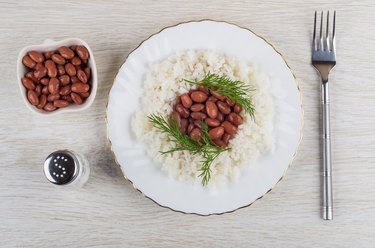
The key to losing weight is to eat fewer calories than you use throughout the day. This creates a calorie deficit, causing your body to burn stored fat, leading to weight loss. Reduced calorie intake is one of the benefits of not eating meat anymore.
Giving up meat — either temporarily or as a change to a semi-vegetarian lifestyle — is one way to cut calories. Substituting vegetarian alternatives for red and processed meats can lower the fat and calories in your meals and help you shed pounds.
Video of the Day
Video of the Day
Read more: The Ultimate Guide to Fat Loss
Protein and Weight Loss
Protein is important for weight loss, as it helps people to feel full and satisfied after eating. One of the disadvantages of not eating meat can be finding alternative sources of protein.
A review published in The American Journal of Clinical Nutrition in June 2015 noted that the potential for increased weight loss due to decreased appetite is most likely if you get at least 25 grams of protein in each meal.
Meat is one of the main sources of protein for many Americans, but there are lots of other, potentially lower calorie options for meeting your protein needs.
Consider the Calories in Meat
Meat is a significant source of calories in the diet, which is why cutting back can be helpful. Processed meats are high in fat, sodium and calories and are not healthy for weight loss.
Many people eat more than one serving of these meats, so switching to a non-meat protein source can potentially result in a large number of calories saved.
Review the Research
Giving up meat, poultry and seafood and going vegetarian may make it easier to lose weight. A January 2016 review article in the Journal of General Internal Medicine reported people on a vegetarian diet lost more weight than those on a non-vegetarian diet.
In addition, those following a vegan diet — which excludes all animal products, including eggs, dairy and honey — shed more weight than people eating a vegetarian diet, including eggs and dairy products.
The authors suggested that weight reduction associated with a vegetarian diet might be related to increased intake of vegetables, fruits and whole grains.
Read more: 10 of the Most Common Weight-Loss Mistakes
Lose Weight the Right Way
Making other changes besides giving up meat will make it even easier to lose weight. For example, foods lower in energy density — or calories per gram — take up more space but don't provide many calories, making it easier to stick within your calorie limit.
Low-energy-density foods include salads, broth-based soups and fruit. Desserts, fried foods, full-fat dairy products and many processed foods that are high in fat or sugar are among the foods higher in energy density, according to the Centers for Disease Control and Prevention.
Each pound of weight loss requires a 3,500-calorie deficit, so if you aren't a big meat eater, you won't lose weight very quickly simply by giving up meat.
Cutting 500 calories per day from your daily total will help you lose up to a pound a week, and increasing your daily exercise to 30 to 60 minutes per day can further increase your calorie deficit and speed up your weight loss, according to Mayo Clinic.
- Journal of General Internal Medicine: "Vegetarian Diets and Weight Reduction: A Meta-Analysis of Randomized Controlled Trials"
- The American Journal of Clinical Nutrition: "The Role of Protein in Weight Loss and Maintenance"
- Mayo Clinic: "Metabolism and Weight Loss: How You Burn Calories"
- Centers for Disease Control and Prevention: "Low-Energy-Dense Foods and Weight Management: Cutting Calories While Controlling Hunger"
- HealthAliciousNess.com: Bacon, Ham and Egg
- HealthAliciousNess.com: Yogurt, Tofu and Cottage Cheese
Was this article helpful?
150 Characters Max
0/150
Thank you for sharing!
Thank you for your feedback!